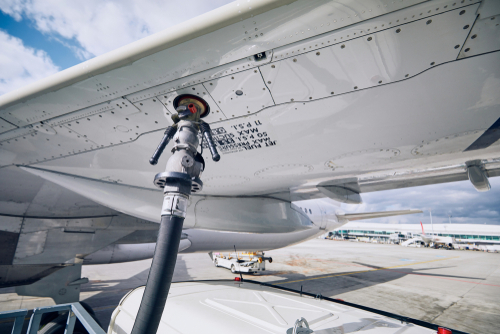Cargo airlines weather the storm of fuel price hikes

The cost of fuel has been a pain point in the aviation industry throughout 2022, but air cargo carriers have tackled the challenge with tenacious determination.
Expensive fuel is not a new phenomenon, however, a perfect storm of economic and political issues has seen prices continue to rise this year until they flattened out in early July, according to S&P Global data shared by IATA (figure one).
In February, against a backdrop of strong demand for still limited capacity due to the pandemic, the Ukraine-Russia war forced airlines to fly longer routes to avoid Russia-Ukraine airspace and increase their fuel usage, and now inflation is rising around the world.
The latest data from the joint Platts – IATA Jet Fuel Price Monitor shows the jet fuel price for the week ending July 15 was up 85.7% compared with a year ago at $146.4/bbl.
The jet fuel price average for 2022 at the time of writing (year to date) is $143.6/bbl. The impact of jet fuel price developments on 2022’s industry total fuel bill is $134.3bn.
A McKinsey & Company article published in July stated that according to US Energy Information Administration (EIA) and Federal Reserve Bank of St Louis (FRED) economic data, since the start of 2022, the price of jet fuel has increased by approximately 90% and costs roughly 120% more, on average, than it did in 2021.
The management consulting company has suggested price hikes may prompt airlines to limit overcapacity.
“Counterintuitively, high fuel prices might not necessarily be a bad thing for the industry. Even though it causes short-term pain, it also increases marginal costs of flying—which can foster greater capacity discipline. This, in turn, drives healthier industry economics and can help profitability,” the report stated.
Air Cargo News spoke to three air cargo businesses to find out what action they have taken to tackle increased fuel costs.
Alaska Air Cargo took the standout decision not to implement a fuel surcharge in June and said its decision still stands.
The Washington, US-based airline said it aims to ensure its business is robust by focusing on digitalisation and investing in freighters – it aims to double its freighter fleet capacity over the next year and will have five all-cargo aircraft in service by the end of 2023.
Alaska also plans to support SAF, though it has not specified whether it will do this by purchasing fuel or by other means. SAF is still expensive with limited accessibility, but is anticipated to become more mainstream as production and infrastructure is developed.
Adam Drouhard, managing director, Alaska Air Cargo, said: “In regards to the fuel surcharge, our plan hasn’t changed. The industry and logistics has gone through a number of drastic changes since the start of the pandemic and the surge in fuel price has provided a new level stress on this industry.
“Our focus is on the long term; through investments in more efficient 737-800 freighters, arriving next year, innovating our business with digitisation, and support of SAF fuels, all of which help insulate us from swings in the cost brought on by the environment.”
Dubai-based Emirates SkyCargo said fuel costs now comprise the company’s largest expense. The Al Maktoum International Airport-hubbed cargo airline has been closely monitoring fuel prices and has implemented a surcharge using “scientific and transparent” methodology.
Matthew Scott, Emirates SkyCargo, vice president Cargo Pricing and Interline, said: “Fuel costs have more than doubled compared to the same period last year, and we are watching these developments closely, as it is currently the largest component of our operating costs.
“SkyCargo has a fuel surcharge mechanism and it helps manage the uncertainty of global oil prices and recover the incremental fuel cost required to operate our business in a viable way. To calculate the surcharge, Emirates SkyCargo monitors 10 global markets to calculate the average price per barrel of jet fuel.
“It’s a very scientific and transparent method and it’s posted on our website, which is updated weekly with information sourced from S&P Global Insights.”
DHL Express has also implemented a fuel surcharge, and like Emirates SkyCargo this is regularly reviewed with analysis of economic influences. DHL said the surcharge means DHL Express can continue to invest in sustainable aircraft and infrastructure.
“The impact of fuel price change on DHL is minor, and fuel costs make up only 3% of the Group’s total cost base and are mainly related to our DHL Express aircraft fleet,” explained DHL.
“DHL Express applies an automatic fuel surcharge for shipments, which is updated on a monthly basis. Also in our other divisions, fuel price movements are automatically factored into regular freight rate movements and are addressed in customer contracts if of major relevance.
“We make price adjustments on an annual basis taking into consideration inflation and currency dynamics as well as administrative costs related to regulatory and security measures.
“The adjustment allows the company to further invest in its infrastructure network, strengthen the resilience against crises, and provide the needed capacity growth due to rising customer demands.
“We have also invested comprehensively in new lower carbon-emissions aircraft, expanding our green fleet, developing its global hub and gateway network and top-of-the-line sorting technology armed with multiple processing capacities.”
The future for jet fuel prices is uncertain, but as the aviation industry is under pressure to decarbonise and SAF looks set to remain the frontrunner for long-haul cargo flights, the sector faces the challenge of affordable fuel, whatever the type.
The Jet Fuel Price Monitor is a joint Platts – IATA initiative. The index and price data shows the global average price paid at the refinery for aviation jet fuel at the reported date.
Rebecca Jeffrey www.aircargonews.net
